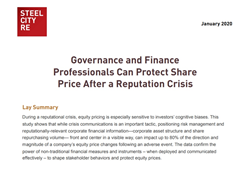[ad_1]

Thinking of reputation as a product of media coverage and trying to manage crises purely through marketing is rarely effective.
“More than 60% of equity damage can be mitigated through governance and risk management strategies.”
PITTSBURGH (PRWEB)
January 29, 2020
A new study of high-profile reputational crises over the past decade demonstrates for the first time how the severe impacts to stock price can be diminished – during and after a reputational crisis – through strategic steps taken by governance, finance and risk management executives.
The study by Steel City Re, which analyzes and underwrites corporate reputational risk, shows that while crisis communications is an important tactic, positioning risk management and reputationally-relevant corporate financial information—corporate asset structure and share repurchasing volume— front and center in a visible way, can impact up to 80% of the direction and magnitude of a company’s equity price changes following an adverse event.
The cases studied included Boeing Company, Bausch Health, BP PLC, Equifax Inc., Facebook, Inc., Johnson & Johnson, Samsung Electronics Co., Target Corporation, United Continental Holdings, Inc., Volkswagen AG, Wells Fargo & Company, and Wal-Mart Stores Inc., all of which suffered from a crisis that threatened their reputation at some point in the last decade. A white paper describing the study’s methodology and results can be found at https://steelcityre.com/steel-city-re-white-paper-january-2020/.
The data reviewed in this study point to several steps companies’ leadership can take to mitigate crises and diminish potential equity losses, including:
- Reducing the percentage of the firm’s balance sheet assets that are intangible, as a way of minimizing equity losses in first days after a crisis occurs;
- Buying back shares with some of those liquidated assets, as a way of minimizing equity losses in the first year after a crisis occurs;
- Managing enterprise reputation risk and the firms reputational value volatility, as a way of mitigating risk and reducing equity losses by the second year after a crisis;
- Utilizing financial instruments such as insurances to communicate governance and enterprise risk management strategies to stakeholders in simple and credible terms.
Steel City Re CEO Nir Kossovsky, author of “Reputation, Stock Price and You” (Apress, 2012), said:
“More than 60% of equity damage can be mitigated through governance and risk management strategies. Thinking of reputation as a product of media coverage and trying to manage crises purely through marketing is rarely effective. Reputational value is a measure of companies’ ability to meet or exceed stakeholder expectations – they need to deploy marketing along with strong risk management, finance and governance controls.”
Steel City Re
Steel City Re provides advisory services and reputational insurance products for businesses and their leadership. It pioneered synthetic measures of reputational value that inform its advisory services, Wall Street equities arbitrage strategies, the pricing by Lloyd’s and other insurers parametric risk transfer solutions and compliance by insurance captives bearing reputation risk.
Share article on social media or email:
[ad_2]

